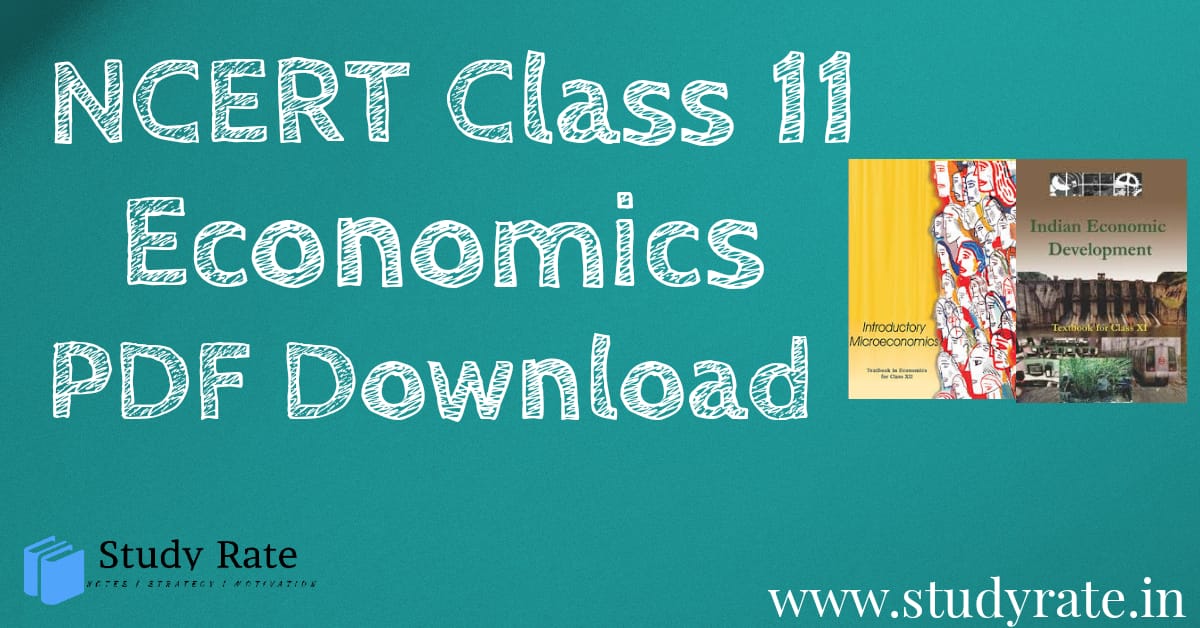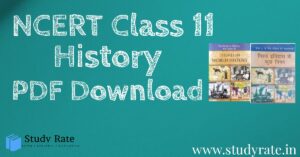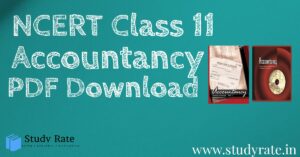The National Council of Educational Research and Training (NCERT) is an autonomous body entrusted with the responsibility of publishing textbooks such as the NCERT book for Class 11 Economics For the CBSE examination, students can adhere to the NCERT book of Economics Class 11 as it elucidates on all topics and concepts included in the CBSE syllabus. All necessary topics are also systematically covered in this book.
NCERT Books Class 11 India Economic Development: The National Council of Educational Research and Training (NCERT) publishes India Economic Development textbooks for Class 11. The NCERT Class 11th India Economic Development textbooks are well known for it’s updated and thoroughly revised syllabus. The NCERT India Economic Development Books are based on the latest exam pattern and CBSE syllabus.
NCERT keeps on updating the India Economic Development books with the help of the latest question papers of each year. The Class 11 India Economic Development books of NCERT are very well known for its presentation. The use of NCERT Books Class 11 India Economic Development is not only suitable for studying the regular syllabus of various boards but it can also be useful for the candidates appearing for various competitive exams, Engineering Entrance Exams, and Olympiads.
NCERT Books Class 11 Economics PDF Download
| Class | 11th |
| Board | CBSE |
| Book | NCERT |
| Subject | Economics |
| Medium | English / Hindi |
| Study Materials | Free Study Materials Available |
| NCERT Economics | NCERT Economics Book Class 11 PDF Download |
NCERT Class 11 Economics Books in English
Unit I : Development Policies And Experience (1947-1990)
Unit II : Economic Reforms Since 1991
Unit III: Current Challenges Facing The Indian Economy
- Chapter 4 : Poverty
- Chapter 5 : Human Capital Formation In India
- Chapter 6 : Rural Development
- Chapter 7 : Employment: Growth, Informalisation And Other Issues
- Chapter 8 : Infrastructure
- Chapter 9 : Environment And Sustainable Development
- Chapter 10 : Comparative Development Experiences Of India And Its Neighbours
NCERT Books for Class 11 India Economic Development (Hindi Medium)
Unit I : Development Policies And Experience (1947-1990)
Unit II : Economic Reforms Since 1991
Unit III: Current Challenges Facing The Indian Economy
- Chapter 4 : Poverty
- Chapter 5 : Human Capital Formation In India
- Chapter 6 : Rural Development
- Chapter 7 : Employment: Growth, Informalisation And Other Issues
- Chapter 8 : Infrastructure
- Chapter 9 : Environment And Sustainable Development
- Chapter 10 : Comparative Development Experiences Of India And Its Neighbours
Class 11 Introductory Microeconomics NCERT Book PDF
| Introductory Microeconomics Prelims(Open) Guide for using QR Code(Open) Chapter 1(Open) Chapter 2(Open) Chapter 3(Open) Chapter 4(Open) Chapter 5(Open) Chapter 6(Open) Download complete book |
Why NCERT Class 11 Economics Book is Important
The importance of NCERT Books for Class 11 Economics are listed below:
- NCERT Books for Class 11 Economics covers all the important topics and concepts that are prescribed in NCERT Curriculum and CBSE Class 11 Economics Syllabus.
- All the topics and concepts are explained in easily understandable language.
- Helps to build strong foundation on all the concepts.
- If students are clear with questions and answers present in NCERT books then they can easily score good marks in the examination.
- Students can easily prepare for their board exams.
- Most of the questions asked in the board examination are completely from the NCERT Solutions.
- Helps to understand the basic concepts clearly.
- Helps in preparation of scholarship exams like NTSE, Olympiad as most of the scholarship exams syllabus is same as NCERT Syllabus.
- Students who are aiming to secure prestigious Government Jobs such as UPSC, FCI must have good knowledge of NCERT Books.
We hope that this detailed article on NCERT Books Class 11 Economics helps you in your preparation and you crack the Class 11 exams or competitive exams with excellent scores.
NCERT Books for CBSE Class 11 Economics PDF Free Download
Class 11 NCERT Economics Book PDF
NCERT Class 11 Economics Book PDF is considered a useful study material for both school and CBSE Exam. The simplified approach towards vital topics tends to make it easier for students to grasp fundamentals effectively.
By referring to an Economics Class 11 NCERT book PDF, students will be able to understand and distinguish between the two fundamental concepts of macroeconomics and microeconomics better. NCERT economics book will help them become familiar with concepts like the Indian economy, employment, sustainable development, etc.
On that note, let’s take a quick look at the various concepts covered in the book!
Chapter 1: Indian Economy on the Eve of Independence
The first chapter economics books for class 11 offers a detailed idea about the Indian economy just after independence. The chapter highlights the struggles of a stagnant economy and underdevelopment after 1947. Students will find out in detail about factors responsible for the stagnation of agriculture and the state of the industrial sector during British rule.
Additionally, the chapter covers topics pertaining to – drain of India’s wealth, demographic condition, occupational structure and infrastructure, among others. Also, topics like India’s National and Per Capita Income, offers a fair insight into Bengal’s textile industry and state of foreign trade.
Chapter 2: Indian Economy (1950-1990)
Here students will find more details about the condition of Indian economy post-1947. Chapter 2 of class 11 NCERT economics PDF walks us through India’s 5-year Plans and other changes responsible for formulating the several sector-specific developmental policies.
Students will avail compact information on economic planning, socialism and mixed economy. Also, essential concepts like – Goals of 5-year plans and importance, problems and reforms of agriculture are covered in it.
It further introduces us to policies like the Green Revolution and helps us understand the types of economy and their features with greater ease. In turn, it will help to understand how the policies and reforms affect our current economy.
Chapter 3: Liberalisation, Privatisation and Globalisation – An Appraisal
The said chapter walks us through the background of the reformative policies, which were introduced to revive the Indian economy. Students will learn about the importance of and the need for economic reforms.
Subsequently, students will become familiar with vital concepts of liberalisation, privatisation and globalisation and their related objectives. In turn, NCERT economics class 11 PDF help them understand things like – direct taxes, indirect taxes, disinvestment and policy strategies pertaining to globalisation.
This particular chapter also provides vital information about the World Trade Organisation and emphasises its functions too. Other than that, one will also learn about the Sircilla tragedy and failures of economic reforms in general.
Chapter 4: Poverty
This particular chapter helps students to understand the concept of poverty and its impact on the Indian economy in general. It is said to be a crucial concept not just in the scope of NCERT Class 11 Economics Book PDF but also in economics.
Students will find out, in brief, the concept of absolute and relative poverty and will find out the accurate definition of the poverty line. Additionally, readers will be able to understand the different categorisation of poverty and their causes better.
One will also become familiar with the various measures that prove useful in combating the impact of poverty successfully. In fact, the chapter also helps readers to gain a detailed idea about the several poverty alleviation programmes, which have been initiated by the government of India.
Chapter 5: Human Capital Formation in India
The concept of human resource and its creation plays an essential role in human development and economic growth. Besides highlighting the definition of human capital and the process of creating the same, the chapter also helps distinguish between financial and physical capital.
Readers will become familiar with the various sources of human capital formation and its direct impact on the economy. For example, one will find out what happens when the productivity of physical capital increases.
Additionally, the chapter also covers the problems concerning human capital in the country. However, economics NCERT class 11 PDF book also highlights the growth of India’s education sector. It also helps to understand the RTE Act more effectively.
Chapter 6: Rural Development
Things like rural development, rural credit and agriculture marketing are covered in depth in the 5th chapter of NCERT class 11 economics PDF book. For instance, students will learn about rural credit – its types and sources in detail.
Other than these, topics like organic farming, sustainable development and Golden Revolution are also touched upon in this chapter. It also includes an analysis of rural banking, its major advantages and noteworthy drawbacks.
Likewise, they will become familiar with the topic of sustainable development and the benefits and limitations of organic farming. A quick reading of this chapter in the PDF download version will help students to strengthen their knowledge of all these topics and benefit their exam preparation significantly.
Chapter 7: Employment Growth, Informalisation and Other Issues
NCERT Class 11 Economics Book PDF introduces students to the concept of employment growth, informalisation and other related topics in this chapter. For example, readers will learn about the different types of unemployment and suitable ways to overcome them.
Once students download the PDF version of this book, readers will gain valuable insight into the significant types of workers. It will also help to understand the distribution of employment as per rural and urban area and gender.
Additionally, the chapter also provides a step-by-step insight into how to compute the rate of unemployment and workforce participation rate. It will help gain a better understanding of the distribution and, in turn, will come in handy to solve problems based on the same.
Chapter 8: Infrastructure
It covers all those challenges that tend to affect the social and economic infrastructure of India. A quick reading of the NCERT 11 economics PDF equips students with valuable information pertaining to the types and significance of infrastructure in the country.
Readers will avail detailed information on the overall health infrastructure in India, including the primary, secondary and tertiary healthcare sector. Also, they will gain a brief introduction to medical tourism in the country.
Students can download the PDF book from online to find out more about the concepts and associated topics in general. They will also be introduced to the state of women’s health in brief.
Chapter 9: Environment and Sustainable Development
The 9th chapter of class 11 economics book briefs students about the importance of the environment for the growth of the economy by detailing its functions. Moreover, the chapter also emphasises the underlying problems pertaining to the environment like – pollution and overexploitation. Students can download the NCERT Class 11 Economics Book PDF and learn about the effective strategies for sustainable development.
Nevertheless, to understand and implement the concept of sustainable development in real-life readers should also go through the significant pointers of a major environmental crisis. For example, a crisis like global warming, ozone depletion and land degradation has emerged as the prominent causes of biodiversity loss.
Chapter 10: Comparative Development: Experiences of India and its Neighbours
The last chapter economics NCERT class 11 PDF book helps to understand and compare India’s development against the development of its neighbouring countries like Pakistan, China, Bangladesh, etc.
A thorough reading of the chapter will come in handy for understanding the comparison indicators better. In turn, it will prove useful in assessing the developmental of functional strategies adopted by the neighbouring countries.
Students will further become familiar with the foreign direct investment and demographic profile of the neighbouring countries. It will help readers to get a better grasp of the developmental strategies and policy-oriented failures of the country.





